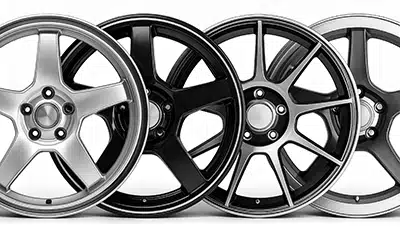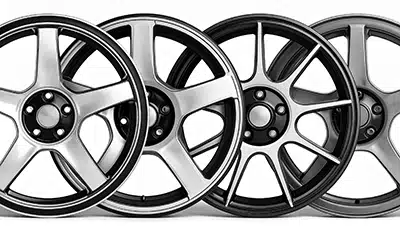The Evolution of Tuner Wheel Culture
Tuner wheels represent the perfect intersection of form and function, born from Japan's innovative automotive culture and embraced worldwide by enthusiasts seeking both performance gains and distinctive styling. At Custom Wheels N Tires, we understand that for import and JDM enthusiasts, wheel selection is about more than just appearance—it's a critical performance component that reflects your vehicle's character and your personal automotive philosophy.
Today's tuner wheel market offers unprecedented variety, from authentic JDM (Japanese Domestic Market) designs to European-inspired motorsport wheels engineered specifically for import platforms. Let's explore the essential aspects of tuner wheels to help you make an informed decision for your performance build.
Essential Tuner Wheel Styles
Mesh Design Wheels: Race-Inspired Versatility
Mesh design wheels feature tightly arranged spoke patterns creating a distinctive woven or mesh appearance. This style traces its origins to Japanese touring car racing, where strong, lightweight wheel designs were essential for competitive advantage.
Key characteristics of quality mesh wheels include:
- Multi-spoke patterns providing excellent structural integrity
- Visual complexity that complements modern vehicle designs
- Effective brake cooling through numerous air channels
- Available in concave profiles for aggressive fitment
Popular among Honda, Acura, and Subaru enthusiasts, mesh wheels offer the perfect balance of motorsport heritage and street presence. Premium brands like Rays Volk Racing, Work Wheels, and SSR have defined this category with iconic models that remain coveted by serious enthusiasts.
Split-Spoke Wheels: Dynamic Precision
Split-spoke designs feature primary spokes that divide as they extend from the center to the rim, creating Y-shaped or forked patterns. This configuration combines visual interest with exceptional strength-to-weight ratios.
Advantages of quality split-spoke wheels include:
- Distinctive dimensional appearance with depth and character
- Excellent structural engineering distributing forces efficiently
- Larger windows for improved brake visibility and cooling
- Modern aesthetic that complements European and Japanese sports cars

Split-spoke designs have become particularly popular on Nissan, BMW, and Volkswagen performance builds, offering contemporary styling that enhances the vehicle's lines while providing performance benefits.
5-Spoke and 6-Spoke: Timeless Performance
Simple 5-spoke and 6-spoke wheels represent perhaps the most timeless tuner wheel designs, inspired by classic racing wheels from manufacturers like Rays and Enkei. These straightforward patterns emphasize clean lines and structural efficiency.
Benefits of classic spoke designs include:
- Maximum strength with minimal material for optimal weight savings
- Timeless aesthetic that resists changing trends
- Excellent brake clearance for upgraded calipers and rotors
- Simple maintenance with easy-to-clean surfaces
These wheels remain popular across all tuner platforms, from Mazda MX-5s to Toyota Supras, offering a perfect foundation for builds focused on performance fundamentals rather than fleeting style trends.
Multi-Piece Wheels: Premium Customization
Multi-piece construction represents the pinnacle of tuner wheel engineering, featuring separate components (typically two or three pieces) that are precisely assembled to create a single wheel. This approach enables unprecedented customization and fitment options.
Advantages of multi-piece wheels include:
- Custom offsets and widths tailored to specific vehicles
- Mix-and-match finish options between lips, faces, and barrels
- Serviceable components that can be replaced individually if damaged
- Distinctive stepped lip designs for maximum visual impact
Premium brands like BBS, Work Wheels, and HRE define this category, offering handcrafted quality and endless customization for enthusiasts seeking the ultimate in exclusivity and personalization.
Material and Construction Technologies
Tuner wheels utilize various manufacturing methods, each offering distinct benefits and characteristics:
Forged Aluminum: Ultimate Performance
Forged wheels represent the pinnacle of wheel technology, created by compressing aluminum under extreme pressure to align the metal's grain structure. This results in a significantly stronger wheel compared to cast alternatives.
Advantages of forged wheels include:
- Maximum strength-to-weight ratio for reduced unsprung mass
- Superior resilience against impacts and deformation
- Enhanced vehicle responsiveness and acceleration
- Improved braking performance through reduced rotational inertia
- Premium finish quality with exceptional durability
While forged wheels command premium prices, their performance benefits make them the preferred choice for serious enthusiasts and competitive motorsport applications where every gram matters.
Flow-Formed/Rotary-Forged: Performance Value
Flow-forming technology represents a hybrid manufacturing process that begins with a cast wheel that undergoes a secondary spinning process under high pressure and heat. This aligns the aluminum's grain structure similarly to forging but at a lower cost.

Benefits of flow-formed wheels include:
- Significantly lighter than traditional cast wheels
- Enhanced strength, particularly in the barrel area
- Performance approaching forged wheels at a more accessible price point
- Greater design flexibility than fully forged options
For many enthusiasts, flow-formed wheels hit the sweet spot between performance, aesthetics, and budget, making them increasingly popular in the tuner community.
Gravity Cast: Style Within Reach
Traditional gravity casting involves pouring molten aluminum into molds, creating wheels with excellent design flexibility at more affordable price points. Modern casting techniques have vastly improved quality compared to earlier generations.
Features of quality cast wheels include:
- Wide variety of complex designs and finishes
- Excellent value for casual enthusiasts and daily drivers
- Improved manufacturing techniques enhancing strength and consistency
- Good durability for normal street driving conditions
Cast wheels offer an excellent entry point into the tuner wheels market, allowing enthusiasts to achieve the desired aesthetic while saving for potential performance-focused upgrades later.
Fitment Considerations for Import Vehicles
Proper fitment is critical for tuner applications, where precision matters for both performance and aesthetics:
Offset and Stance
Wheel offset (measured in millimeters) determines where the wheel sits in relation to the hub mounting surface. For tuner applications, proper offset selection is crucial for both function and style:
- Higher positive offset: Wheels sit further inward, providing more clearance for suspension and fender components
- Lower positive or negative offset: Creates a more aggressive stance with wheels sitting further outward
Import vehicles typically require specific offset ranges that differ from American platforms. Our fitment experts can help you navigate these specifications to achieve your desired look without compromising performance or safety.
Hub-Centric Fitment
Many premium JDM and European wheels are designed to be hub-centric, meaning they locate on the vehicle's hub rather than the lug nuts for proper centering. This requires:
- Correct hub bore size matching your vehicle's hub diameter
- Proper hub-centric rings for wheels with larger center bores
- Appropriate hardware including extended studs or conversion bolts when necessary
Proper hub-centric fitment eliminates vibration issues and ensures optimal load distribution, particularly important for performance driving applications.
Brake Clearance
Import performance vehicles often feature upgraded brake systems requiring specific wheel clearance considerations:
- Spoke design and placement must accommodate larger calipers
- Inner barrel profile needs sufficient depth for rotor clearance
- Some builds may require specific wheel designs engineered for big brake kits
Our experts can help identify wheel options that provide proper clearance for both factory and aftermarket brake setups without compromising your desired aesthetic.
Key Takeaways: Tuner Wheels
- Tuner wheels balance aggressive styling with performance-focused engineering
- Mesh designs offer race-inspired patterns with excellent structural integrity
- Split-spoke configurations provide distinctive aesthetics with efficient force distribution
- Classic 5-spoke and 6-spoke wheels deliver timeless styling with optimal weight savings
- Multi-piece construction enables unprecedented customization for the ultimate personalized setup
- Forged wheels offer maximum performance benefits with significant weight reduction
- Flow-formed technology provides an excellent balance of performance and value
- Proper fitment consideration is essential for both aesthetics and functionality
- Offset selection dramatically impacts both stance and performance characteristics
Frequently Asked Questions
How much weight can I save with premium tuner wheels?
Weight savings vary significantly based on construction method and design. Compared to factory wheels, high-quality forged wheels typically reduce weight by 5-15 pounds per wheel, with some ultralight racing designs saving even more. Flow-formed wheels usually save 3-8 pounds per wheel, while even well-designed cast wheels might save 1-3 pounds over heavy OEM options. These weight reductions deliver noticeable improvements in acceleration, braking, and handling response.
Are authentic JDM wheels worth the premium over replicas?
Authentic Japanese wheels from brands like Rays, Work, and SSR command higher prices because of their superior engineering, materials, and quality control. While replicas may look similar, they typically compromise on weight, strength, or precision. For daily drivers with modest performance goals, quality replicas from reputable manufacturers can provide reasonable value. However, for serious performance builds or track use, the engineering advantages of authentic JDM wheels justify their premium pricing.
What's the ideal wheel size for balancing performance and style?
The optimal wheel size depends on your specific vehicle and goals. For maximum performance, many track-focused enthusiasts prefer 17" or 18" wheels that allow for tires with taller sidewalls, providing better compliance and potentially faster lap times. For street builds balancing performance and aesthetics, 18" or 19" wheels typically offer the best compromise. Show cars prioritizing style might opt for 19" or 20" wheels, though these larger sizes introduce performance compromises through increased weight and reduced tire sidewall.
How do I protect my investment in premium tuner wheels?
Protecting high-end wheels requires proper maintenance and careful driving. Use pH-balanced wheel cleaners specifically designed for your wheel's finish, avoid automatic car washes with harsh brushes, clean wheels regularly to prevent brake dust etching, and apply quality wheel sealant every few months. Be mindful of potholes and curbs, consider slightly higher profile tires for added protection, and in winter conditions, either switch to dedicated winter wheels or be extremely cautious on roads with salt and ice.
Can I run a staggered fitment on my front-wheel drive vehicle?
While staggered fitments (wider wheels/tires in the rear) are traditionally used on rear-wheel and all-wheel drive vehicles, they can work on front-wheel drive platforms primarily for aesthetic purposes. However, there are important considerations: you cannot rotate tires front-to-rear, handling balance may be affected with potentially increased understeer, and some performance benefits of wider tires are lost by not placing them on the driven axle. For front-wheel drive vehicles seeking performance, a square setup (same size all around) with appropriate width is typically more functional.
At Custom Wheels N Tires, our specialists understand the unique requirements of import and JDM enthusiasts. Whether you're building a show-stopping stance car or a track-focused performance machine, we can help you navigate the world of tuner wheels to find the perfect balance of style, performance, and value for your specific application.